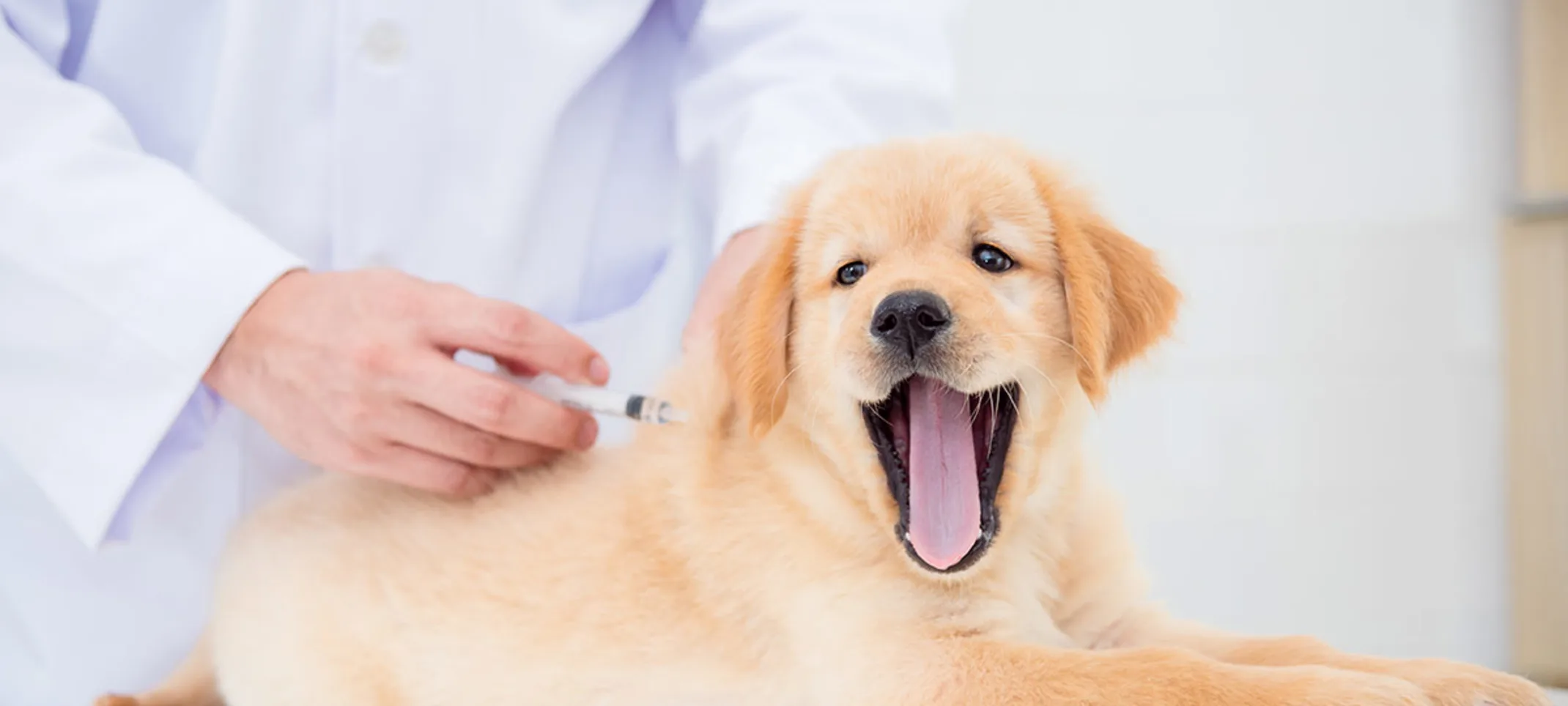Pacific Veterinary Hospital
Vaccinations
Preventative care is an important aspect in maintaining your pet’s health. Proper vaccination is vital in protecting them against harmful diseases.

Overview
We believe that preventative care is one of the most important aspects of maintaining your pet’s health. There are a variety of diseases that affect animals, so proper vaccination of your pet is vital in protecting them from the many types of illnesses to which they are susceptible to.
Why are vaccinations important?
Vaccinations are vital to the health and protection of your pet and serve as a preventive measure in combating viral diseases like Parvovirus, Parainfluenza virus, Distemper, Lyme Disease, Panleukopenia, Feline Leukemia Virus, and Rabies.
When should my pet get vaccinated?
Vaccinations are particularly important for puppies, kittens, and other young animals that have immature immune systems. Veterinary vaccinations generally begin at 6-8 weeks of age and then boostered throughout your pet’s life depending on the vaccine. Our doctors will determine the appropriate vaccination plan for your pet.
How are vaccines administered?
Vaccines help to combat diseases by exposing the pet's immune system to inactive or small amounts of a particular form of bacteria or virus. Vaccines are administered through subcutaneous injection (under the skin), orally, or intra-nasally, depending on the vaccine.
Vaccinations are accompanied by a consultation and examination with our veterinarians to make certain that your pet's condition is stable enough to receive them. Proper and timely administration is necessary to ensure optimal protection.
Dogs
If your dog is going to be spending time in kennels, dog parks, or the groomers, we recommend that they also be vaccinated against kennel cough.
Your canine friend should be routinely vaccinated against the following:
Rabies
Rabies is a deadly disease caused by a virus that attacks the nervous system. The virus is secreted in saliva and is usually transmitted to people and animals by a bite from an infected animal. There is no treatment once the clinical signs of rabies appear. Once symptoms appear, it is nearly always fatal.
Leptospirosis
A bacteria-based disease is usually spread by infected water. It causes fever, lethargy, vomiting, bloody diarrhea, and jaundice in your pet. Severe infections can cause organ failure and death. It can be treated by antibiotics, but the bacteria can be carried for months afterward and their urine will remain a health hazard to both other animals and humans. Leptospirosis in humans can be fatal.
Canine distemper virus
Spread by bodily fluid contact, there is no specific treatment for this virus. Those who survive commonly have neurological difficulties later in life. Symptoms include fever, coughing, diarrhea, and vomiting.
Canine parvovirus
Spread by contact with feces from infected dogs, it mainly affects puppies, but can also be seen in dogs that have not had regular booster vaccinations. Symptoms include vomiting and diarrhea and dehydration. Without treatment, 80% of dogs with parvovirus will die. Treatment has an approximately 85% success rate.
Infectious canine hepatitis
Infection is passed via bodily fluid contamination, and the virus can survive in the environment for prolonged periods. There are two types of the virus, a kennel cough-type infection and a liver infection (hepatitis). Symptoms are almost identical to parvovirus. The symptoms can be treated rather than the main disease, but most dogs will survive.
Cats
Your feline friend should be routinely vaccinated against the following:
Rabies
Same with dogs, rabies is just as harmful to cats and once symptoms appear, it can be fatal.
Feline calicivirus
Commonly called ‘cat flu’ as its symptoms include sneezing, fever, discharge from the nose and eyes, and mouth ulcers. Spreads via cat-to-cat contact, airborne contact, or contamination of the living environment. Vaccination prevents some strains but not all.
Feline herpes virus
Spread by the saliva or discharge from the nose and eyes in infected cats, it can also survive in its environment. Like feline calicivirus, it is a type of ‘cat flu’ and symptoms include fever, sneezing, conjunctivitis, and discharge from the eyes. Once a cat has had feline herpes, it is infected for life and may suffer recurrent flare-ups that are treated with antibiotics and eye drops.
Feline infectious enteritis
Spread by the feces and urine of infected cats, this virus attacks their immune system, leaving the animal unable to fight infection. Pregnant cats can transmit the disease to their kittens while they are in the womb. Symptoms include fever, seizures, vomiting, diarrhea, and dehydration.
Cats dubbed ‘at risk’ should also be vaccinated against feline leukemia virus
This disease is thought to spread only by very close contact with infected cats, such as milk from mother to kitten or bite wounds. It is much more common in city areas, and among unneutered and stray cats. Multi-cat households also present a higher risk. The symptoms include poor body condition and coat, anorexia, diarrhea, and jaundice.

